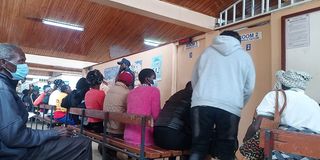Exclusive: My horrifying first-hand experience as a patient at PGH (Part 2)

Patients wait for their turn to see the doctor at the casualty area at PGH Nakuru. A security guard traverses the area to assists with any inquiries.
My consultation lasted barely five minutes and I was directed to the X-ray department at around 14:55. Here I was again directed to the billing area to pay for the service.
Although there weren't as many people as there had been at lunchtime, I wasn't sure how many people were ahead of me at the x-ray point and decided to leave.
The long queues and endless waiting seem to put many people off, who are seeking medical attention.
But there have been worse situations, such as that of 72-year-old Peter Mbugua, who was diagnosed with TB, an experience that unfortunately led to his untimely death, according to his son, David Njuguna.
MtaaWangu spoke to Njuguna who accompanied his father to the facility in the early hours of June 28, 2024 after his health deteriorated overnight.
"My father's health deteriorated significantly on Saturday night. We took him to PGH at 5am on Sunday morning. While he was being treated and given fluids in the emergency room, I was instructed to fill in forms and do the billing, which took about 40 minutes. By 6am, his condition had improved to the point where he was able to speak and we were told to take him to ward 12 and wait for the doctor," says Njuguna.
Njuguna says that during this time, the doctor on shift instructed a non-uniformed staff to disconnect the drip and move his father to the ward. When they asked about the drip, they were told to wait for the doctor.
As time passed, Njuguna said they saw tea being distributed and wanted to buy some for his father. In the midst of searching for tea, cups and other personal items for his admission, they were told at 7am that visiting hours were over.
They had not been seen by a doctor in the time since they left the emergency room.
Heartbreakingly, at around 8am, after they had been asked to leave and were still outside the ward eating breakfast, a doctor informed them of his death.
Njuguna believes that if his father had been attended to earlier by a doctor on the ward, the outcome might have been different.
"When we saw that his speech had improved after he was put on a drip, we hoped it would continue and he'd recover well. We can't help but wonder if quick medical attention could have saved his life," he says.
At four o'clock on Wednesday, I returned for a second visit after social media was ablaze with locals complaining about the hospital's services.
This time it looks like a ghost town. I assume one of two things: either today was a slow day for the hospital and patients have left, or because the complaints reached the right people, our medical system has miraculously been streamlined overnight. Dare we thank the heavens?
I also noticed in the casualty area that unlike the previous day, when a security guard helped patients by pointing them in the right direction, today there was a lady dressed in white, presumably a nurse.
MtaaWangu contacted Dr James Waweru, PGH's Medical Superintendent, to find out the hospital's position on standard procedures for patient care, the time taken to deliver services and the skipping of queues.
"Patient care is handled by doctors and nurses. When a nurse transfers a patient to another area, the nurse in that area takes over to ensure accountability," explains Dr Waweru.
"Jumping the queue is most likely being done by employees of the company currently providing our security services. We are in the process of making changes and are looking to bring in another security company which will hopefully stop this behaviour. As for the issue of queues at the time of billing, this is something I am actively pursuing to ensure that changes are made," Dr Waweru says.


